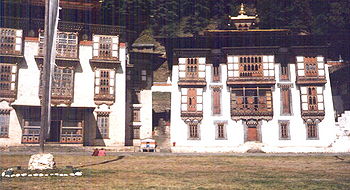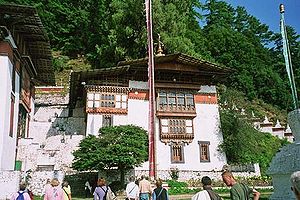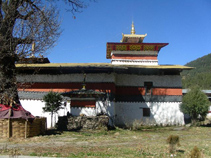
Bumthang District
Encyclopedia



Dzongkhag
A dzongkhag is an administrative and judicial district of Bhutan. The twenty dzongkhags of Bhutan are further divided into 205 gewogs. Some larger dzongkhags have one or more of an intermediate judicial division, known as dungkhags , which themselves comprise two or more gewogs...
(districts) comprising Bhutan
Bhutan
Bhutan , officially the Kingdom of Bhutan, is a landlocked state in South Asia, located at the eastern end of the Himalayas and bordered to the south, east and west by the Republic of India and to the north by the People's Republic of China...
. It is the most historic dzongkhag if the number of ancient temples and sacred sites is counted. Bumthang consists of the four mountain valleys of Ura, Chumey, Tang and Choekhor ("Bumthang"), although occasionally the entire district is referred to as Bumthang valley.
"Bumthang" directly translates as "beautiful field" – "thang" means field or flat place, and "bum" is said be an abbreviation of either "bumpa" (a vessel for holy water, thus describing the shape and nature of the valley), or simply "bum" ("girl," indicating this is the valley of beautiful girls).
Economy
Bumthang farms yield buckwheatBuckwheat
Buckwheat refers to a variety of plants in the dicot family Polygonaceae: the Eurasian genus Fagopyrum, the North American genus Eriogonum, and the Northern Hemisphere genus Fallopia. Either of the latter two may be referred to as "wild buckwheat"...
, dairy product
Dairy product
Dairy products are generally defined as foods produced from cow's or domestic buffalo's milk. They are usually high-energy-yielding food products. A production plant for such processing is called a dairy or a dairy factory. Raw milk for processing comes mainly from cows, and, to a lesser extent,...
s, honey
Honey
Honey is a sweet food made by bees using nectar from flowers. The variety produced by honey bees is the one most commonly referred to and is the type of honey collected by beekeepers and consumed by humans...
,apples, potato,rice,and woolen products and many other products.
Languages
The language spoken in the Bumthang district is known as BumthangkhaBumthang language
The Bumthang language is an East Bodish language spoken by about 36,500 people in Bumthang and surrounding districts in central Bhutan...
. It is a Tibeto-Burman language closely related to Dzongkha, the national language of Bhutan. Bumthangkha is partially comprehensible to speakers of Dzongkha, which originated in valleys to the west of Bumthang. Each of the four valleys of Bumthang has its own dialect, and the remnants of the Kheng kingdom, near and in Zhemgang District to the south, speak Khengkha
Khengkha
Khengkha, also called the Kheng language, is a member of the Tibeto-Burman language family spoken in the Zhemgang, Trongsa and Mongar districts of south central Bhutan...
. Historically, Bhumthangkha and its speakers have had close contact with speakers of Kurtöpkha
Kurtöp language
The Kurtöp language is a member of the Tibeto-Burman language family spoken in the Kurtoe Gewog, Lhuntse District, Bhutan...
to the east, Nupbikha to the west, and Khengkha
Khengkha
Khengkha, also called the Kheng language, is a member of the Tibeto-Burman language family spoken in the Zhemgang, Trongsa and Mongar districts of south central Bhutan...
to the south, to the extent that they may be considered part of a wider collection of "Bumthang languages."
Brokkat
Brokkat language
The Brokkat language is an endangered Southern Tibetan language spoken by about 300 people in the village of Dhur in Bumthang Valley of Bumthang District in central Bhutan. Brokkat is spoken by descendants of pastoral yakherd communities.- External links :*...
, an endangered Southern Bodish language
Bodish languages
The Bodish languages, named for the Tibetan ethnonym bod, are the Tibetan languages in a broad linguistic sense, regardless of whether the speakers are considered ethnically Tibetan. Different scholars divide Bodish differently, but the alternate term 'Tibetan' generally excludes East Bodish...
, is spoken by about 300 people in the village of Dhur
Dhur
Dhur is a town in western Chhoekhor Gewog, Bumthang District in central Bhutan.Dhur is the main area where Brokkat, one of the endangered languages of Bhutan, is spoken.-External links:*...
in Bumthang Valley. The language is a remnant of pastoral yak
Yak
The yak, Bos grunniens or Bos mutus, is a long-haired bovine found throughout the Himalayan region of south Central Asia, the Tibetan Plateau and as far north as Mongolia and Russia. In addition to a large domestic population, there is a small, vulnerable wild yak population...
herd communities.
Environment
Most of Bumthang is part of Bhutan's extensive protected areas network. The northern two-thirds of the district (Chhoekhor, Tang GewogTang Gewog
-References:...
s) belong to Wangchuck Centennial Park
Wangchuck Centennial Park
Wangchuck Centennial Park in northern Bhutan is the kingdom's largest national park, spanning over five districts, occupying significant portions of northern Bumthang, Lhuntse, and Wangdue Phodrang Districts. It borders Tibet to the north and is bound by tributaries of the Wong Chhu basin to the...
, buffered by pockets of biological corridors. Southern Bumthang (Chhumig
Chhume Gewog
-References:...
, Tang
Tang Gewog
-References:...
, Ura Gewog
Ura Gewog
-References:...
s) is part of another protected area, Thrumshingla National Park
Thrumshingla National Park
Thrumshingla National Park in central Bhutan covers just over across four districts, but primarily in Mongar. It is bisected by the Lateral Road, and contains the Thrumshing La pass.-Flora and fauna:...
.
Geography
Bumthang District is divided into four gewogs:- Chhume GewogChhume Gewog-References:...
- Choekor Gewog
- Tang GewogTang Gewog-References:...
- Ura GewogUra Gewog-References:...
Bumthang also contains several notable towns:
- Chhumey
- JakarJakarJakar is a town in the central-eastern region of Bhutan. It is the district capital of Bumthang District and the location of Jakar Dzong, the regional dzong fortress...
- the district administrative headquarters - Tang
- Ura
Landmarks
- Membar Tsho (Burning Lake), where sacred scriptures hidden by Guru Rimpoche in the 8th century were later recovered by Pema LingpaPema LingpaPema Lingpa or Padma Lingpa was a famous saint and siddha of the Nyingma school of Tibetan Buddhism. He was a preeminent terton , and is considered to be foremost of the Five Terton Kings...
in the 15th century - Kurje Monastery
- Jakar Dzong, adjacent to the main town of JakarJakarJakar is a town in the central-eastern region of Bhutan. It is the district capital of Bumthang District and the location of Jakar Dzong, the regional dzong fortress...
- Jambay LhakhangJambay LhakhangJambay Lhakhang, also spelled Jampey Lhakhang or Jampa, is located in Bumthang in Bhutan, and is said to be one of the 108 temples built by Tibetan King Songtsen Gampo in 659 AD on a single day, to pin down an ogress to earth forever.-Legend:...
, one of the two most ancient temples of Bhutan, built in the 7th century by Songtsen GampoSongtsen GampoSongtsän Gampo Songtsän Gampo Songtsän Gampo (Tibetan: སྲོང་བཙན་སྒམ་པོ་, Wylie: Srong-btsan sGam-po, 569–649?/605–649? was the founder of the Tibetan Empire (Tibetan: Bod; ), by tradition held to be the thirty-third ruler in his dynasty. In the Chinese records, his name is given as 'Sōngzàngānbù'...
, the king of Tibet. - Tamshing LhakhangTamshing LhakhangTamshing Lhakang in the Bumthang District of central Bhutan is the most important Nyingmapa temple in Bhutan. The temple and monastery are remarkable for their direct connection to the Bhutanese saint Pema Lingpa. It is now a seat of Lama Sungtrul Rinpoche the current speech incarnation of Pema...
, the most important Nyingmapa temple in the country - Padtshaling Gonpa, The monastery was established by the first Padtshaling Tulku Siddha Namgyal Lhendub in 1769, according to the prophecy of Lhasa Jowo.

